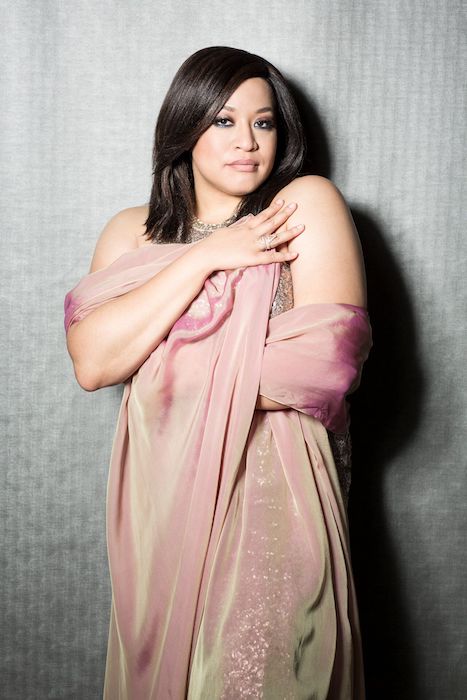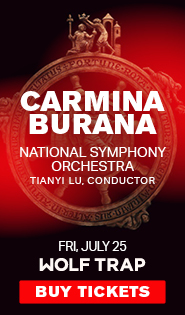Fast-rising soprano Michelle Bradley sensational in Vocal Arts debut

The human voice can lift a listener to greater heights than other instruments. Instrumentalists can dazzle with virtuosic runs, overwhelm with sonic power, and whisper with soft intensity. When singers do those things, though, it comes directly from their bodies, from the same mechanisms of sound most humans possess.
When it all comes together, as it did many times in the Vocal Arts DC debut recital of Michelle Bradley on Wednesday night, the effect can take your breath away. The Kentucky-born soprano, a recent product of the Metropolitan Opera’s Lindemann Young Artist Development Program, held the Kennedy Center Terrace Theater in spellbound silence in a broad range of musical styles. She was assisted by the subtle pianist Ken Noda, who retired this summer as musical adviser to the Lindemann Program.
French mélodies came first, with three songs of Henri Duparc. Bradley shaded down the raw power of her voice, producing a more transparent tone in “L’invitation au voyage” and “Chanson triste,” as well as clear and comprehensible French diction. The last song of the set, “Phidylé,” stood out for the caressing of text and melodic line, especially in the sighing lassitude of the slow refrain (“Repose, ô Phidylé”).
An utterly different character took over Bradley’s performance in Samuel Barber’s transfixing Hermit Songs. A setting of mostly obscure Latin texts in Irish medieval manuscripts, translated into English, the piece veers from the spiritual and exalted to the most earthly and base. Bradley found a caustic edge in her voice for “At Saint Patrick’s Purgatory,” followed by enigmatic elegance in the more distant “Church Bell at Night.” Floated, pillowy high notes at the end of the yearning “Saint Ita’s Vision,” about nursing the Christ child, gave way to the jagged, drunken happiness of “The Heavenly Banquet.”
Further proving her versatility, Bradley succeeded in both the starkness of “The Crucifixion,” with its ear-nettling bird calls, and in “Sea Snatch,” through skillful negotiation of the vocal line darting maniacally up and down. Many of the songs are so short that they play as aphorisms, but with a surprising economy of musical variation and subtle facial expressions Bradley could tell an entire mischievous story, as in just a few bars in “Promiscuity.”
Bradley unleashed the full power of her voice’s dramatic soprano side in an opera aria, “Ah, dagli scanni eterei” from Verdi’s Stiffelio. With her booming chest voice and incendiary high notes, Bradley has enormous potential in this repertory. She could clearly hold interest in the way that she limned the emotional extremes of the churning recitative that introduced this aria.
Cutting a few French songs from the second half was the right decision, repertoire that is less ideal for Bradley’s voice at this point.
That afforded her the chance to focus on her expansive, fervid rendition of Richard Strauss’s Four Last Songs. Noda did his best to evoke the power of a large orchestra that should ideally balance out the plush fullness of Bradley’s sound. Strong breath support made possible exceptionally long phrases at slow tempi.
Those vocal qualities proved exhilarating in the air-lifted flight of the soul in the final stanza of “Beim Schlafengehen,” the soprano’s tone brilliant and even over its entire wide range. More subtle approaches suited the nostalgic “September” and perhaps went too far in the concluding “Im Abendrot.” This song, taken at a glacial pace, almost stalled in Noda’s postlude, where those double-trilled larks took their sweet time serenading the fading sunset.
Often when classically trained singers attempt American Gospel standards, the results are stilted. Bradley, a self-avowed “country girl,” took us to church with her first encore, a blazing rendition of “He’s Got the Whole World in His Hands.” The sense of ownership of a musical style was no less pronounced in a second encore, Leonora’s blockbuster aria “D’amor sull’ali rosee” from Verdi’s Il Trovatore. Bradley, who spoke of Leontyne Price as her idol, did reverent homage to the great soprano from Mississippi in this rendition.
Vocal Arts DC presents soprano Rosa Feola and pianist Iain Burnside in a recital centered on Italian composers 7:30 p.m. January 17. vocalartsdc.org; 202-669-1463

